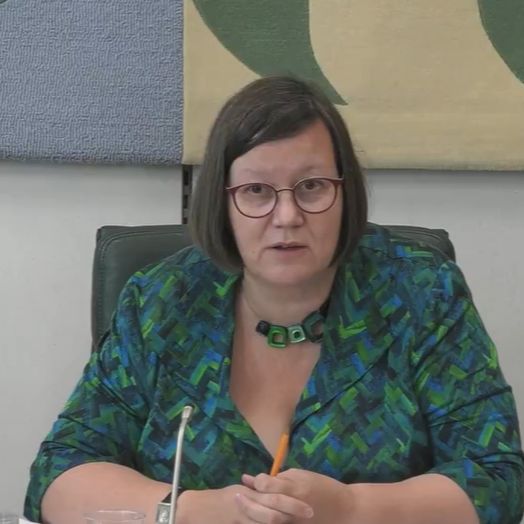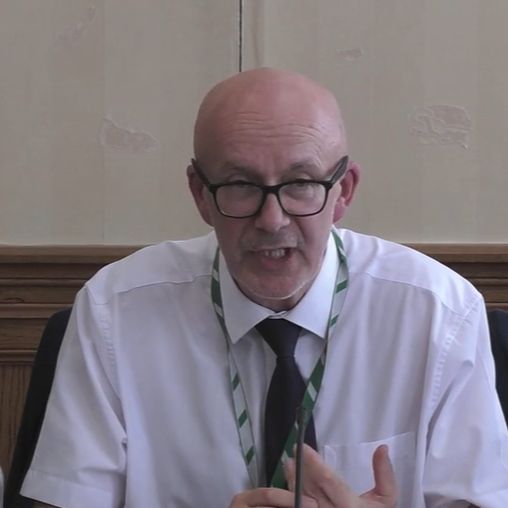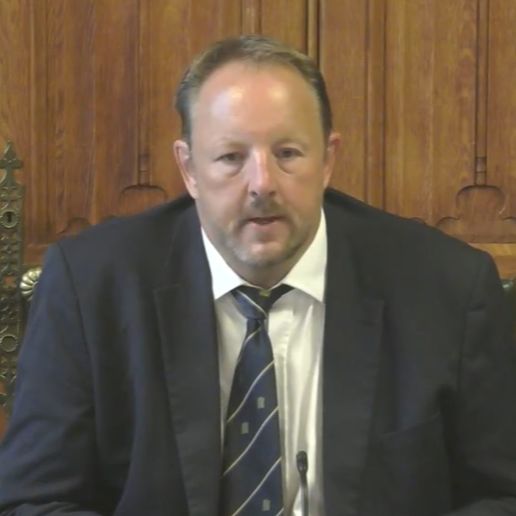Treasury Committee
Chaired by: Dame Meg Hillier, Labour MP for Hackney South and Shoreditch

Current inquiries: Spending Review 2025; National Wealth Fund; work of HM Treasury; AI in financial services; lifetime ISA; acceptance of cash
What makes a good select committee chair?
Having had the privilege of experiencing multiple select committees, including almost a decade chairing them, I’d like to think I’ve got a decent grip on how to lead an effective committee. A good chair recognises and draws on the strengths of their colleagues to shape its work. I see it as being a bit similar to conducting an orchestra. My members are incredibly effective at scrutinising complex policy. They include lawyers, journalists and even two former Treasury ministers. It’s up to me to ensure we take full advantage.
What has been the biggest challenge you’ve encountered in the last year – or the thing that has surprised you most?
The real-time impact. My time on other committees was spent looking retrospectively, whereas now we see announcements made ahead of our hearings. Similarly, I am very alert to the market sensitivity of our work. We aren’t just scrutinising in the abstract. Our work can have real implications.
I feel the weight of that responsibility, particularly when we have people like the governor of the Bank of England in front of us, as what they say – and sometimes what they don’t – has the power to move markets. Understanding how to navigate that has been vital to the success of our work.
How easy have you found it to call your chosen witnesses, and how helpful and informative have you found witnesses during hearings?
My committee has a profound responsibility to scrutinise some of the most consequential public institutions in Britain. The Bank of England, the Financial Conduct Authority and Treasury officials who appear before us don’t just understand this; I can tell they genuinely agree that parliament should scrutinise these issues. And that’s a brilliant situation for us to be in. That’s not to say it’s always so straightforward, though. In a recent report, we had to highlight an unfortunate exception at the Financial Ombudsman Service. I am hopeful, though, that this was an anomalous situation which won’t repeat itself. I’ve also been pleased with the engagement we’ve had from the private sector. We’ve held public sessions with CEOs at banks, building societies and insurers, which I think is really important.
How responsive has your chosen department been to your committee’s reports and recommendations so far?
It’s no secret that the Treasury is under intense pressure. Difficult decisions have had to be made as it faces the incredible challenge of managing the public purse. Despite this pressure, we have seen most Treasury ministers, including the chancellor twice. That’s not bad going. We’ve also had some real wins, including the Bank of England’s commitment to monitor cash acceptance following our report on the issue. The government’s willingness to publish further details on the Office for Value for Money in light of concerns we raised was also a positive sign. I certainly expect our productive and honest relationship to continue.
What are your priorities for the next 12 months?
I’ve watched with interest as the Treasury pursues growth in the finance sector. I’ll be keeping an eye on what this could mean for consumer protection and deregulation. Following our work on cash acceptance, I am also eagerly anticipating the financial inclusion strategy. We are keen to see how the Treasury plans to ensure that modernising our economy considers the whole country, including the most vulnerable. We will be delving into the motor finance situation and the National Wealth Fund remains squarely on my radar. Our work examining how AI is being used in the financial services sector will also continue. I’ll be paying particular attention to the sector’s plans to safeguard consumers as AI use widens.
Joint Committee on Human Rights
Chaired by: Crossbench peer Lord Alton
.jpeg) Current inquiries: Human rights and the regulation of AI; proposal for a draft Human Rights Act 1998 (remedial) order 2025; human rights of children in the social care system in England; crime and policing bill; border security, asylum and immigration bill; transnational repression in the UK; forced labour in UK supply chains
Current inquiries: Human rights and the regulation of AI; proposal for a draft Human Rights Act 1998 (remedial) order 2025; human rights of children in the social care system in England; crime and policing bill; border security, asylum and immigration bill; transnational repression in the UK; forced labour in UK supply chains
What makes a good select committee chair?
They need to listen and lead. For a select committee to work effectively, all its members must be included in setting its direction, questioning witnesses and deliberating its conclusions. But the chair also needs to ensure that they are working together effectively, delivering a targeted programme of work that enables a range of topics to be scrutinised in a timely fashion.
What has been the biggest challenge you’ve encountered in the last year – or the thing that has surprised you most?
My biggest surprise was to have been elected chair of the JCHR. It is unusual for a member of the House of Lords to be elected chair of the committee, but perhaps the members were looking for continuity in completing important work begun in the last parliament on issues such as accountability for Daesh crimes and exploitation of labour through modern-day slavery.
How easy have you found it to call witnesses, and how helpful and informative have you found them during hearings?
The JCHR scrutinises issues right across government. This can be a challenge because thematic inquiries require us to engage with departments where we haven’t built up an existing relationship and we then have to start afresh when we move on to a new inquiry. We greatly value and continue to have regular sessions with senior ministers responsible for human rights and the law. These are beneficial to understanding the government’s programme and in holding them to account.
How responsive has the government been to your committee’s reports and recommendations so far?
It is still early days, but the government responded promptly to our first report of this parliament and we hope this continues as we go forward.
What are your priorities for the next 12 months?
We will be pushing departments to respond to the recommendations in our recent big reports on modern slavery in supply chains and transnational repression. Before the summer recess, we launched two new inquiries and will begin taking evidence on them this autumn. One examines how well the human rights of children are protected in the care system. We will also look at the impact that AI may have on human rights, the risks and opportunities it provides, and whether the current legislative framework is adequate to oversee it. We will also continue our important work reviewing government legislation to ensure that new laws are compatible with human rights.
Joint Committee on the National Security Strategy
Chaired by: Matt Western, Labour MP for Warwick and Leamington

Current inquiries: The national security strategy; undersea cables
What makes a good select committee chair?
Few issues are as important as a government’s ability to keep its citizens safe. Given a remit as critical as that, chairs of committees like mine need to have no fear in standing up for their members. If I think the government is getting something wrong, I’ll tell the minister – even those I count as friends.
What has been the biggest challenge you’ve encountered in the last year – or the thing that has surprised you most?
The global security landscape is being reshaped before our eyes. The changing posture of the United States, huge increases in defence spending across Europe, and ongoing efforts of hostile states to destabilise our economy and society: the challenges we face are huge and identifying the right decisions on these issues is becoming increasingly complex. I think we’re helping to illuminate the choices available to the government, alongside the implications and trade-offs.
How easy have you found it to call your chosen departmental witnesses, and how helpful and informative have you found witnesses during hearings?
Coordinating security across government departments is an immense challenge, and there will always be occasional back and forth about arrangements. But I find ministers typically want to help rather than obfuscate, and our evidence sessions are highly engaging.
How responsive has the government been to your committee’s reports and recommendations so far?
My committee meets less regularly than others, so we’re still working on our first report. But I’m confident that the government will engage properly with it.
What are your priorities for the next 12 months?
We’ll soon be publishing our report into undersea cables, after ministers gave evidence to us before the summer. After that, we are focusing on evidence sessions for our inquiry into the new national security strategy – a huge cross-government undertaking that requires detailed scrutiny.
Environmental audit committee
Chaired by: Toby Perkins, Labour MP for Chesterfield and Staveley

Current inquiries: Addressing the risks from perfluoroalkyl and polyfluoroalkyl substances (PFAS); airport expansion and climate and nature targets; governing the marine environment; flood resilience in England; the UK and the Antarctic environment; environmental stability and housing growth; the role of natural capital in the green economy
What makes a good select committee chair?
Committee chairs might be sat centre-stage in the committee room, but a big part of our job is to bring all of our colleagues into the action. The Environmental Audit Committee has MPs from almost every party in parliament, so it’s important that all perspectives are heard. A good chair will ensure opinions they disagree with are still heard and opinions they agree with are still robustly challenged.
But the vast majority of a chair’s work is done away from the TV cameras – meeting experts, building knowledge, reading representations and reports and deciding who and what the committee should look at.
What has been the biggest challenge you’ve encountered in the last year – or the thing that has surprised you most?
There is a huge range of things that the EAC can look at, so prioritising issues to explore and making sure that we produce reports that are meaningful and impactful but also reflect the committee’s view is a tough task. Also, attempting to ask 16 politicians to keep their contributions short so that we get plenty of time to hear from witnesses, and preventing witnesses from going beyond the question they have been asked, can challenge any chair. We want evidence sessions to be thorough and informative without being overly long. As someone who has had relatively limited select committee experience before this parliament, I have been surprised at quite how enthusiastically our select committees are supported. In a parliament with a large majority in particular, many organisations recognise the crucial role select committees have in holding government to account.
How easy have you found it to call your chosen departmental witnesses, and how helpful and informative have you found witnesses during hearings?
The EAC has a broad remit, so it’s inevitable that the policy issues we look at will cut across different departments. Already we have had ministerial witnesses from the departments for energy security and net zero; environment, food and rural affairs; transport; housing, communities and local government; and the Foreign, Commonwealth and Development Office. We have found some businesses less enthusiastic to talk to us. Select committees’ reputation for probing and exposing sometimes makes firms reticent about appearing. Most witnesses have provided insightful and thoughtful contributions. In the main, the quality has been very high. Ministers have generally been well prepared and briefed. Some have been put under pressure and struggled a little. But I know they all relish and fear select committee appearances and many have, at least in retrospect, enjoyed it.
How responsive has the government been to your committee’s reports and recommendations so far?
In some cases, extremely responsive. On 5 June, we published a report recommending the government ban bottom trawling in 41 marine-protected areas. Four days later, ministers announced they would do exactly that. Naturally, not every recommendation gets that kind of reception, but less than a week from recommendation to adoption is something to aim for.
What are your priorities for the next 12 months?
The committee will be publishing reports for its inquiries into airport expansion; housebuilding and environmental targets; and flood resilience in England throughout the autumn. These are all really important and complex problems, and I’m looking forward to sharing what we’ve learned. We’ve also recently begun evidence sessions for our inquiry into the regulation of PFAS. I know this is an issue many people are very concerned about, so I hope our inquiry will add some useful insights to the debate. After that, your readers will have to stay tuned.